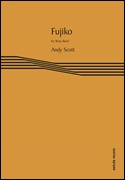We've found 1000 matches for your search. Order by
Results
-
 £26.50
£26.50Fleur de Lis (Solo Cornet/Brass Band)
Cornet Solo with Brass Band
Estimated dispatch 7-14 working days
-
 £24.95
£24.95FUJIKO (Cornet Solo with Brass Band Parts) - Scott, Andy - Fieldhouse, Jim
Brass Band parts only. Fujiko is cinematic soundscape that reflects its Japanese roots. A feature for solo cornet that commences with a simple folk-like melody, and builds to a powerful and emotive climax, before an atmospheric and calm ending. Dur: 5:00
Estimated dispatch 7-14 working days
-
 £15.00
£15.00FUJIKO (Cornet Solo with Brass Band Score) - Scott, Andy - Fieldhouse, Jim
Brass Band score only. Fujiko is cinematic soundscape that reflects its Japanese roots. A feature for solo cornet that commences with a simple folk-like melody, and builds to a powerful and emotive climax, before an atmospheric and calm ending. Dur: 5:00
Estimated dispatch 7-14 working days
-
 £26.50
£26.50 -
 £33.00
£33.00Hazy Jim's Blues (Solo Cornet/Brass Band)
Cornet solo with Brass Band
Estimated dispatch 7-14 working days
-
 £32.95
£32.95JOKER, The (Trombone solo with Brass Band) - Moss, Harold
Brass Band Set (inc. Solo Cornet Conductor)
Estimated dispatch 7-14 working days
-
 £13.00
£13.00Killaryney (Album/BA) (Solo Cornet/Brass Band)
Cornet Solo with Brass Band
Estimated dispatch 7-14 working days
-
 £26.50
£26.50 -
 £13.00
£13.00Last Rose of Summer; Rose of Tralee; Far Away; In Cellar Cool (Solo Cornet/Brass Band)
Solo Cornet with Brass Band
Estimated dispatch 7-14 working days
-
 £26.50
£26.50Les Zephyrs (Solo Cornet/Brass Band)
Cornet Solo with Brass Band
Estimated dispatch 7-14 working days
